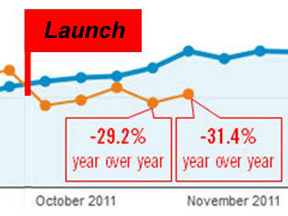Understanding the interplay between search relevance and intent can mean the difference between a well optimized site and a lot of time wasted chasing keywords for which you’ll never rank.
Organic search algorithms rely on a combination of relevance and authority. For any given phrase a searcher types into the search box, the search engine calculates and displays the most relevant and authoritative pages based on its algorithms.
When search was a new, keywords relevance was determined by the number of times a keyword was used on a page. Today search engines factor hundreds of relevance elements into their algorithms, including searcher intent.
Types of Searcher Intent
Search engines try to deliver more relevant results by associating intent with certain keywords. There are three primary categories of searcher intent.
- Navigational. The searcher knows which site he wants to visit, but chooses to use the browser’s search box instead of the address bar in which to type it. In some cases, the searcher may trust Google to return the correct page on a given site more than they trust that site’s own internal search. Searchers expect navigational queries to the correct answer at the top of the search results. Examples of navigational searches include “united airlines,” “yelp.com” or “amazon duracell batteries 9 volt.”
- Informational. Searchers want to research a topic to learn more. The query may center on a specific product, a category of products, a problem the searcher is trying to solve, a concept, where to eat dinner, and so forth. Searchers expect informational queries to yield a set of relevant pages as opposed to the single right answer. Searchers may be willing to try out the information on multiple pages before considering their task complete. Examples of informational searches include “how to change spark plugs,” “chicago sushi, or “best digital camera.”
- Transactional. Searchers want to complete a task, such as download a file, purchase a product, and sign up for a service. Transactional searchers may follow informational searches, such as a customer who searches for information on the best digital camera, uses the information to choose a product, and then searches to find the best place to complete the transaction and purchase the camera online.
If a searcher already knows he wants a specific site and uses a navigational query to reach it, the chances of intercepting that search and luring the customer to your own site via organic search are slim. Depending on the query, it may be possible to woo searchers away with paid search ads, but the guidelines on brand bidding can make that difficult as well.
It’s also not necessary to spend a lot of time and budget optimizing for navigational searches. Search engines happily connect searchers with the brands they request in their search query, assuming that brand’s site meets the most basic requirements of search engine optimization.
Ecommerce marketers need to focus their time and money instead on winning the informational and transactional searches and convert them to sales. Transactional searches are the most valuable, obviously, since the searcher is predisposed to complete some sort of action. But the bulk of the searches conducted are informational: Most people know they want something, they’re just not sure what exactly.
Relevance and Informational Searches
Perhaps the hardest part about informational searches for ecommerce sites is that the most valuable keywords may be only tangentially related to the product they’re selling. It’s tempting to shoot for the stars, but your budget may well be better spent on targeting more relevant keyword phrases.
For example, a site that sells shoes designed to alleviate heel pain may want to rank for “heel pain.” A lot of people — approximately 60,000 a month in the U.S. according to Google Keyword Planner — search for information on heel pain. Winning just five percent of those searches would mean a chance to convert 3,000 visits to sales. That’s pretty tempting.
But is an ecommerce shoe site really relevant for “heel pain?” No, it’s relevant for “shoes.” Even if the site creates a page of great content and products targeting searches for “heel pain,” the best they’re likely to do is rank for “shoes for heel pain” at about 600 searches a month. “Shoes for heel pain” may be an excellent term for the site to target, but it’s important to be realistic about the amount of traffic organic search is likely to drive when allocating resources for SEO. If you plan to target 60,000 searches and actually target 600, you’ll come up with about 1/100th of the traffic intended.
Can an ecommerce site rank on page one in Google for a competitive informational search like “heel pain?” It’s not impossible, but it’s unlikely without a lot of hard work to create stellar content and authority.
Informational searches tend to be monopolized by massive, authoritative, informational sites like Wikipedia, About.com, and news, government, and organization sites. Breaking into the search results amid this kind of competition requires a dedication to creating excellent content with excellent SEO and a strong promotional plan to build authority.
For example, Nordstrom ranks third in Google for the keyword phrase “how to tie a scarf,” for which 49,500 people search in an average month.
To be sure, Nordstrom has a tremendous marketing budget, a powerful retail brand, and fans galore. But it also listened to customers to understand that women think scarves are very pretty and have no idea how to wear them. And Nordstrom matched that customer need with keyword research to identify a keyword phrase to target that’s highly searched and less competitive than other fashion phrases. Then it created a beautiful video showing 16 methods for tying scarves, building off the success of the old-school scarf tying booklet they used to hand out in stores.
Before you dismiss it out of hand, why can’t you do the same thing in your niche? It doesn’t have to be done on a Nordstrom-sized budget. You have access to the same keyword data and creative minds all around you. You know what sells well, and your customer service team can probably tell you all about the things that customers do and don’t like.
Analyze the data and develop a few content ideas that will really resonate with customers. Develop them, optimize them, promote them, share them. That’s how we have to build relevance and authority today compared to the “easy” link building tactics of a few years ago, and it’s hard work. But when it pays off, it’s worth it.
The other option is to focus on optimizing for the keyword phrases that are directly relevant to the products you sell. Focusing on transactional keyword phrases tied directly to your product catalog has the benefit of converting more strongly and being naturally more relevant. However, for the same reasons, they also tend to be highly competitive and you still need to build your site’s authority to rank well.





